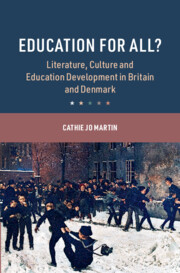Book contents
- Education for All?
- Cambridge Studies in the Comparative Politics of Education
- Education for All?
- Copyright page
- Dedication
- Contents
- Figures
- Tables
- Acknowledgments
- Note on the Text
- Introduction
- 1 Culture and the Politics of Comparative Education Policy
- 2 Culture and Continuity through Institutional Change
- 3 Romancing the Nation: Education and Nation-Building in 1800
- 4 Expanding Educational Access in the Age of Social Realism
- 5 Education in the Age of Empire, Globalization and Technological Change
- 6 Cultural Echoes of the Past in Contemporary Education Reforms
- Bibliography
- Index
2 - Culture and Continuity through Institutional Change
Published online by Cambridge University Press: 27 September 2023
- Education for All?
- Cambridge Studies in the Comparative Politics of Education
- Education for All?
- Copyright page
- Dedication
- Contents
- Figures
- Tables
- Acknowledgments
- Note on the Text
- Introduction
- 1 Culture and the Politics of Comparative Education Policy
- 2 Culture and Continuity through Institutional Change
- 3 Romancing the Nation: Education and Nation-Building in 1800
- 4 Expanding Educational Access in the Age of Social Realism
- 5 Education in the Age of Empire, Globalization and Technological Change
- 6 Cultural Echoes of the Past in Contemporary Education Reforms
- Bibliography
- Index
Summary
Why do successive education reforms within a country resonate with familiar assumptions about educational goals, society, class, and state, even at moments of radical change? Repeating cultural narratives sustain continuities within institutional change processes, by influencing how new ideas are interpreted, how interest groups express preferences, and how institutional norms shape political processes. Repeating narratives make it more likely for some types of reforms to be implemented and sustained than others. This chapter develops a theoretical model suggesting how cultural narratives are transmitted across time and an empirical method for assessing cross-national differences in cultural narratives. Each country has a distinctive “cultural constraint,” or a set of cultural symbols and narratives, that appears in a nation’s literary corpus. Writers collectively contribute to this body of cultural tropes; despite individual fluctuations, they largely reproduce the master narratives of their countries. Computational linguistic processes allow us to observe empirical differences between British and Danish cultural depictions of education in 1,084 works of fiction from 1700 to 1920. Cultural narratives do not determine specific outcomes, as tropes must be activated in political struggles. Yet we can show how significant cross-national differences in literary images of education resonate with British and Danish educational trajectories.
Keywords
- Type
- Chapter
- Information
- Education for All?Literature, Culture and Education Development in Britain and Denmark, pp. 46 - 77Publisher: Cambridge University PressPrint publication year: 2023

